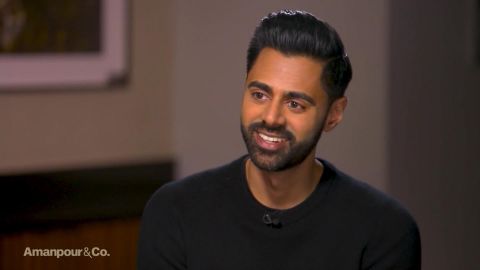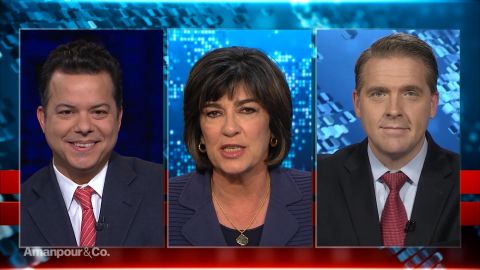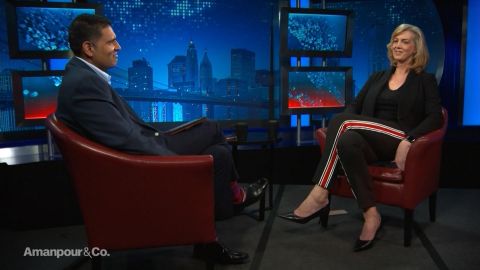Read Transcript EXPAND
CHRISTIANE AMANPOUR: Now, these races may still be up in the air but let’s plunge now below the surface to look at the dark money. Invisible and influential. It is a way of funding political campaigns like the ones happening right now but anonymously. The filmmaker, Kimberly Reed, is bringing it all to the surface now with her new documentary called “Dark Money.” It follows the dollars and cents in her home state of Montana, and here’s a clip.
(BEGIN VIDEO CLIP)
UNIDENTIFIED MALE: Let big money use dark money in this curtain of secrecy to basically buy a legislature or buy a state or eventually ultimately, you know, control public policy in this country. I just can’t see that happening. It won’t be by the people for the people. It’ll be something else, you know?
(END VIDEO CLIP)
AMANPOUR: Now, the filmmaker, Kimberly Reed told our Hari Sreenivasan all about this and how Montana is trying to fight it.
HARI SREENIVASAN: Kimberly, thank you for joining us. First of all, let’s just start with a basic understanding. What is dark money?
KIMBERLY REED, DIRECTOR, “DARK MONEY”: Any money that comes in to an election or a policy debate where we’re not sure where it’s coming from. We don’t know who’s behind that money. And that’s really important because we can’t tell why people are trying to operate in politics. We can’t tell what their motivations are, what their vested interest, what their profit motive is if we don’t know who it is.
SREENIVASAN: What was a Citizens United case? How important was it?
REED: So, the Citizens United case came down in 2010. A lot of people abbreviate it and remember it as saying corporations are people and money is speech. It really turned on the 1st Amendment and if you assume that corporations have rights of personhood and have free speech rights and if you assume that money is speech then, therefore, corporations can’t be hindered from speaking in elections, you know, they can’t be kept from spending money in elections.
SREENIVASAN: Their money is their voice? Republican Their money is their voice. When Citizens United first passed, a lot of people were immediately up in arms that we were going to have unlimited money in political campaigns and that is certainly has an enormous impact. What people didn’t really anticipate is that money would also become anonymous. And when you have anonymous and unlimited money being spent in elections, it really distorts our democracy.
SREENIVASAN: You spent at least six years looking at this topic in Montana. Why Montana?
REED: It’s a very good case study. I think it’s the best-case study. It’s small enough that we could sort of tell a story that takes place in this microcosm so that people can really wrap their heads around this story. A lot of times — I mean, we are talking about an issue where people are intentionally trying to hide money and the influence of money. So, it helps to have a microcosm where we can connect all the dots and show how it all works. And I’m from there. And I think I also thought like a Montanan thinks. I went to school learning about the influence of a couple copper barons who ran the state about 100 years ago and I think having that skepticism towards the role of money in politics was an essential thing for me to — you know, it’s a good place to come from to understand the issue and to maybe see how the drama was going to develop over that long period of time.
SREENIVASAN: You know, there’s a clip that we want to play out where this is an investigative reporter who has been doing a lot of groundwork in the state that you follow in the documentary and he just literally just at a whiteboard explaining how this whole cycle works. Let’s take a look.
(BEGIN VIDEO CLIP)
JOHN ADAMS, INVESTIGATIVE JOURNALIST: This corporation wants to influence our politics but they don’t want the public to know that they’re trying to influence our politics because that could hurt their bottom line perhaps. So, they give money to a dark money group so they send out all of the mudslinging and the postcards and the things that people hate receiving flooding their mailboxes. This corporation is not affiliated with all of the dark money spending because they have essentially laundered it through this. And all of this supports a candidate. When that candidate gets elected, they support the agenda of the corporation. That’s the feedback loop for dark money. Corporation, funnels money to a pack, the pack sends out postcards attacking the opponent of the candidate who they want to get elected. When that candidate gets elected, they support the agenda of the corporation or individual. I mean, this could be done with individual money. It’s really, really scary when you think about it.
(END VIDEO CLIP)
SREENIVASAN: Give me an idea of the scale that we’re talking about here. How prevalent is dark money? I mean, when I hear dark, I think dark matter in the universe, right, there’s definitely out there, we don’t know how much. How prevalent is dark money in politics today?
REED: I’m afraid you’re right, we don’t know exactly how much. There’s really no way that we’re ever going to know because a lot of it is just not claimed by the groups who are spending it. But a group called Issue 1 recently, since our film came out, Issue 1 came out with a study where they stated that since 2010 when Citizens United came out, they’re kind of measuring the effects of Citizens United, that over $600 million has been spent just by the top 15 groups who are spending that. So, the answer, unfortunately, is we don’t know. I think it’s important to notice that we aren’t able to tell what the effect of that spending is until well after the elections that it was operating in, right. I mean, that money is being spent and it’s getting people elected, laws are beingmade, laws are being repealed. Our government is being changed. And even if we find out now, after the fact, some eight years after Citizens United has been passed what the ultimate impact of that money is, I think it just kind of underlines how important this issue is. We don’t know where this money is coming from at the time during an election or a policy debate or a judicial nomination when we should know where that money is coming from.
SREENIVASAN: And you said judicial nomination, just recently we had the Brett Kavanaugh hearings. It basically looks like it almost turned into a campaign where it was who can spend more, who can get the message out whether to support or not —
REED: Yes.
SREENIVASAN: — a specific nominee.
REED: Yes. And that campaign, I think you can call it a campaign, was being run primarily by 501(c)(4) dark money groups. And they were —
SREENIVASAN: Supporters of Brett Kavanaugh?
REED: Supporters of Brett Kavanaugh.
(BEGIN VIDEO CLIP)
UNIDENTIFIED FEMALE: Tell your senator, confirm Kavanaugh.
(END VIDEO CLIP)
REED: Before that, they were supporters of Neil Gorsuch and his nomination.
(BEGIN VIDEO CLIP)
UNIDENTIFIED FEMALE: I have to say I’m 100 percent comfortable with Judge Gorsuch becoming the next Supreme Court justice.
(END VIDEO CLIP)
REED: And before that, they were posing the nomination of Merritt Garland to that same seat.
(BEGIN VIDEO CLIP)
UNIDENTIFIED FEMALE: He could tip the ideological balance to create the most liberal Supreme Court in 50 years.
(END VIDEO CLIP)
REED: It doesn’t just happen on the right. In this case, there was a lot more money that came from the political right wing. One disturbing trend
that I saw with the Kavanaugh nomination was that groups from the left sprang up. They didn’t spend nearly as much money. They spent about a
tenth.
(BEGIN VIDEO CLIP)
UNIDENTIFIED FEMALE: Enough is enough.
(END VIDEO CLIP)
REED: It doesn’t bode well that a judicial Supreme Court nomination turns into a campaign where we have two dark money groups shouting it out, it doesn’t bode well for our elections when we just have a billionaire on the right and a billionaire on the left kind of shouting at each other. I mean, the real problem with this issue is that it pulls Democratic power away from the individual voter and puts it back into the hands of a couple billionaires who can buy all the ads up.
SREENIVASAN: In the case of Montana, we saw — we’ve got a clip where the very fundamental thing that you expect to know which is who is the person that’s writing the check is just something that escapes anyone in the state. Let’s take a look.
(BEGIN VIDEO CLIP)
UNIDENTIFIED MALE: Dark money is the advertising where you don’t know who’s paying for the ads. Just simply got to hold these up and say, “Who’s paying for this?” Does anybody know anybody in these groups? Who’s paying for this? What are they attempting to buy?
UNIDENTIFIED MALE: I’m a huge advocate of free speech, the right to be able to freely speak. But these groups were abusing that. They had taken free speech and they were speaking from the darkness.
JOHN ADAMS, INVESTIGATIVE JOURNALIST: I don’t know who they are. I don’t know how to fight them. I don’t know how to argue with them. I can’t debate them. I can’t interview them. I can’t pick up the phone and say, hey, what is your interest in candidate X because I don’t know who they are. We’ll never know.
(END VIDEO CLIP)
REED: When somebody has a profit motive and they’re operating in politics and they’re taking over the political dialogue from a lot of individual citizens whose voices get drowned out, I think that that’s where the real travesty of this anonymous politics comes to play.
SREENIVASAN: You mentioned earlier that the left is springing up but sometimes as you point out in this documentary, it’s the right attacking different parts of the right, that even within the party that there can be campaigns to either support you or tear you down and support your competitor. Let’s take a look at the clip.
(BEGIN VIDEO CLIP)
DEBRA BONOGOFSKY (R), CANDIDATE FOR MONTANA LEGISLATURE: The way they want you to vote in the legislature, they will target you at the next primary. Even if you a Conservative or a Republican. But if you don’t vote the way they want you to vote, then they say, “Well, we’re going to target you” and that’s what they do, then they send out all these mailings. They exaggerate their voting records. They don’t care if they lie.
CHUCK JOHNSON, STATE BUREAU CHIEF, LEE NEWSPAPERS: These things all came in at the last minute. This election, my wife and I probably got six, seven, eight of this, every day the last month of the campaign. Boom. Here’s one on taxes and here’s one on healthcare, sex ad, guns. And a lot of these groups, nobody knows who they are. You know, they call them dark money groups and that’s exactly what they are.
(END VIDEO CLIP)
SREENIVASAN: How did Montana stop this?
REED: Montana stopped it I think because a couple people, they happen to be Republicans who were attacked by other Republicans. They got really upset that this was unfair, that folks weren’t playing by the rules, and that they were being ambushed. It’s kind of a western, you know, response to this being ambushed. But the group of Republicans got together with the Democratic governor. It took a couple sessions to really push a bill through but they ended up passing what was called the Disclose Act which called for a bunch of different ways to understand where money is coming from in politics and for these groups who are spending it to report it immediately and make it available online. So that’s sort of transparency in elections I think is – has really helped clean up the elections in Montana a lot.
SREENIVASAN: What’s the role on a federal level for the U.S. government to figure out any semblance of a check or a balance? We have a federal election commission, right? We have members of each party that sit there and they’re supposed to write the rules of the road on how elections are run.
REED: Yes. And FEC which is supposed to do that. As we talk right now, it only has four of six members. One of the themes we follow in the film is the inefficacy how the FEC is really hamstrung and unable to enforce campaign finance law.
(BEGIN VIDEO CLIP)
REED: When I first got there, to the FEC, I thought that we would be able to work together on issues such as disclosure and transparency but it didn’t take long to realize that wasn’t going to happen.
EDWIN BENDER, EXECUTIVE DIRECTOR, FOLLOWTHEMONEY.ORG: At the federal level, there’s the FEC. And then in each state, there’s an agency that regulates money in state politics.
JOHNSON: In Montana, the commissioner of political practices is housed in this little house really. It’s a tiny, little office. I doubt if there’s a smaller office in state government. The very legislators that are investigated by the office determine its funding so it’s always been grossly underfunded. They never have enough people. They never have enough equipment. It’s sort of the forgotten stepchild of Montana government.
(END VIDEO CLIP)
REED: The tendency of the FEC has been to polarize all of the voting issues, all of the Republican members vote in a bloc and the whole enforcement agency has really, really been stymied. That’s important because it has really let dark money get out of control. The efforts to create specific rules on how dark money has to be disclosed in federal races has been stymied. But that’s also extremely important for just because of a couple of trends that have happened in the last couple of election cycles. One is all of this campaigning is moving online. It’s moving to Facebook ads. It’s moving to Twitter ads. It’s moving to a form of campaigning that is much harder to track and requires a lot of immediate attention. As soon as possible. The second issue is the role of foreign money in our elections. We have heard a little bit about that with the Mueller investigation and there’s — there have been hints of the role of Russian oligarch money and we don’t — we can’t really state anything clearly about that but I think it’s a question what the role of foreign money in our elections is and where it’s coming from. And if we don’t have the ability to track that, in a perfect vehicle to avoid tracking, is a dark money group. If we don’t have that, I think our democracy is really imperiled.
SREENIVASAN: All right. Kimberly Reed, thanks so much.
REED: Thank you.
About This Episode EXPAND
Christiane Amanpour interviews Scott Jennings and John Avlon about the impact of national division on the election. Hari Sreenivasan speaks with film director Kimberly Reed about the role of dark money in politcal campaigns. Christiane Amanpour sits down with writer and comedian Hasan Minhaj.
LEARN MORE


